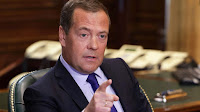In a recent post on his Telegram channel, Russia's former President Dmitry Medvedev issued a stark warning, threatening the use of nuclear weapons if Ukraine's counteroffensive succeeds in reclaiming territories previously annexed by Russia. This aggressive statement has added a new layer of tension to the ongoing Russia-Ukraine conflict.
The conflict between Russia and Ukraine has been a longstanding issue, marked by territorial disputes and geopolitical complexities. In recent weeks, Ukraine has witnessed significant gains in its counteroffensive, reclaiming towns and villages in the south and east of the country. These advances have heightened tensions between the two nations, leading to alarming statements from Russian authorities.
Dmitry Medvedev's warning that Russia would resort to using nuclear weapons in response to Ukraine's counteroffensive reflects the seriousness of the situation. The annexation of Ukrainian territories by Russia has been a contentious matter, and any attempt by Ukraine to reclaim these areas is perceived as an act of aggression by Russia. Medvedev's statement suggests that Russia views the use of nuclear weapons as an inevitable course of action to protect its interests.
The specter of nuclear war has loomed over the Russia-Ukraine conflict since its inception. Early on, Russian President Vladimir Putin put the country's nuclear forces on high alert, signaling the seriousness of the situation. Medvedev's recent threats are not the first of their kind; he has previously made similar statements regarding the use of nuclear weapons in response to perceived threats against Russia.
Medvedev's latest threat has added another layer of complexity to diplomatic efforts aimed at finding a resolution to the Russia-Ukraine crisis. Dialogue between the two nations has been strained, and the possibility of nuclear warfare further complicates the situation. For diplomatic negotiations to progress, both parties must demonstrate a commitment to peaceful dialogue and de-escalation.
The future of the Russia-Ukraine conflict remains uncertain, and Medvedev's nuclear threat only exacerbates the existing tensions. The international community must continue to actively engage with both countries to foster dialogue and de-escalate the situation. Long-term stability in the region can only be achieved through peaceful means and mutual respect for each other's sovereignty.
The recent nuclear threat made by Russia's former President Dmitry Medvedev in response to Ukraine's counteroffensive is a concerning development in the ongoing Russia-Ukraine conflict. The use of nuclear weapons carries catastrophic consequences for global security and stability. Diplomatic efforts must intensify to find a peaceful resolution to the crisis and prevent further escalation. The international community's united stance against the use of nuclear weapons sends a clear message about the gravity of the situation. The path to lasting peace lies in dialogue, cooperation, and a commitment to non-violence.



.png)


.png)

No comments: